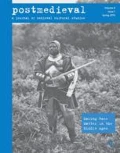Abstract
This essay considers the coexistence of nostalgia and critique of the past in the medievalist historical fictions of Walter Scott, including his verse romance Marmion, and the novels The Monastery, The Abbot, The Talisman, The Betrothed and Ivanhoe. It argues that in these texts Scott's anachronistic medievalism exhibits a ‘reflective nostalgia,’ which blends creative ‘nostalgic memory’ with ‘critical memory,’ and which stages the containment of private chivalric enthusiasm within a respect for political and military realities. Nevertheless, Scott's view of historical change as largely effected by military power also refuses to underwrite history as either providential or inherently progressive. His distinctive nostalgia asserts the lost potential of the past as a missing presence in the here and now.
Similar content being viewed by others
Notes
The same fearless, avoidable deaths occur in Marmion – ‘No thought was there of dastard flight;/Link’d in the serried phalanx tight,/Groom fought like noble, squire like knight,/As fearlessly and well’ (Scott, 1861, 354).
Kenneth, for instance, in The Talisman, is ‘[s]uperior in no respect to the ideas and manners of his time’ (Scott, 1905, 84).
See, The Talisman: ‘They [“the historians”] appear to have been ignorant of the existence of Edith of Plantagenet’ (Scott, 1905, 226 n1), and Marmion: ‘Unnamed by Holinshed or Hall,/He [Wilton] was the living soul of all’ (Scott, 1861, 360).
References
Austin, L.M. 2007. Nostalgia in Transition, 1780–1917. Charlottesville, VA: University of Virginia Press.
Benjamin, W. 1973. Theses on the Philosophy of History. In Illuminations, trans. H. Zohn, 255–266. London: Jonathan Cape.
Bergson, H. 1911. Matter and Memory, trans. N.M. Paul and W.S. Palmer. New York: Macmillan.
Boym, S. 2001. The Future of Nostalgia. New York: Basic Books.
Daiches, D. 1971. Sir Walter Scott and his World. New York: Viking Press.
Eagleton, T., F. Jameson and E.W. Said . 1990. Nationalism, Colonialism, and Literature. Minneapolis, MN: University of Minnesota Press.
Edinburgh University Library. 2004. Homes. The Walter Scott Digital Archive, http://www.walterscott.lib.ed.ac.uk/biography/homes.html, accessed 1 November 2010.
Fussell, P. 1980. Abroad: British Literary Traveling between the Wars. New York: Oxford University Press.
Gamer, M. 2000. Romanticism and the Gothic: Genre, Reception, and Canon Formation. Cambridge, UK: Cambridge University Press.
Hamacher, W. 2005. ‘Now’: Walter Benjamin on Historical Time. In Walter Benjamin and History, ed. A. Benjamin, 39–68. London: Continuum.
Heaney, S. 1972. Linen Hall. In Wintering Out, ed. S. Heaney. London: Faber.
Herbert, G. 1974. Decay. In The English Poems of George Herbert, ed. C.A. Patrides. London: Dent.
Lackey, L. 1992. Vainly Expected Messiahs: Christianity, Chivalry and Charity in Ivanhoe. Studies in Scottish Literature 27: 150–166.
Lukács, G. 1962. The Historical Novel, trans. H. Mitchell and S. Mitchell. London: Merlin Press.
Lynch, A. 1999. Malory Moralisé: The Disarming of Le Morte Darthur, 1800–1918. Arthuriana 9 (4): 81–93.
Scott, W. [1808] 1861. Marmion. In The Poetical Works of Sir Walter Scott, Vol. 7. Edinburgh, UK: Adam and Charles Black.
Scott, W. [1819] 1905. Ivanhoe. London: Macmillan [Border Edition].
Scott, W. [1825] 1905. The Betrothed. London: Macmillan [Border Edition].
Scott, W. [1825] 1905. The Talisman. London: Macmillan [Border Edition].
Scott, W. [1829] 1905. The Monastery. London: Macmillan [Border edition].
Shaw, C. and M. Chase, eds. 1989. The Imagined Past: History and Nostalgia. Manchester, UK: Manchester University Press.
Simpson, D. 2008. ‘Which is the Merchant Here? And Which the Jew?’: Friends and Enemies in Walter Scott's Crusader Novels. Studies in Romanticism 47 (4): 437–452.
Spitzer, L. 1999. Back through the Future: Nostalgic Memory and Critical Memory in a Refuge from Nazism. In Acts of Memory: Cultural Recall in the Present, eds. M. Bal, J. Crewe and L. Spitzer. Hanover, NH: University Press of New England.
Stewart, S. 1993. On Longing: Narratives of the Miniature, the Gigantic, the Souvenir, the Collection. Durham, NC: Duke University Press.
Vrowen, S. 1993. The Ambiguity of Nostalgia. Yivo Annual 21: 69–86.
Author information
Authors and Affiliations
Rights and permissions
About this article
Cite this article
Lynch, A. Nostalgia and critique: Walter Scott's ‘secret power’. Postmedieval 2, 201–215 (2011). https://doi.org/10.1057/pmed.2011.5
Published:
Issue Date:
DOI: https://doi.org/10.1057/pmed.2011.5




